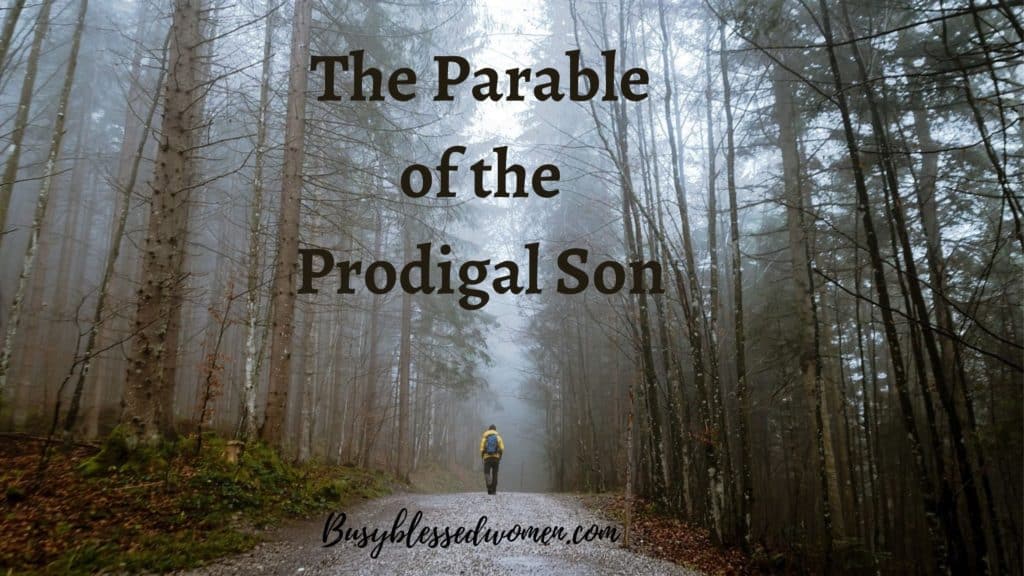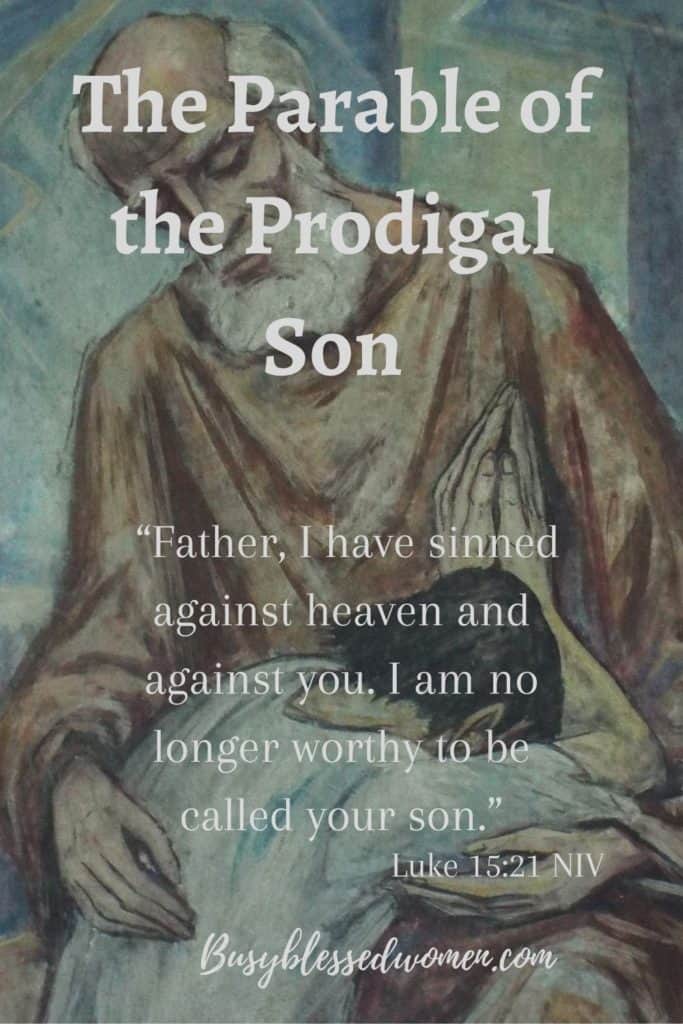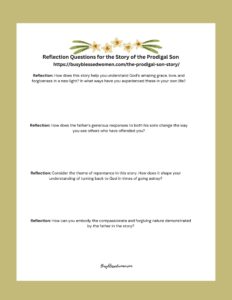The Parable of the Prodigal Son is such a tender story of restoration and the merciful love of God. We find a forgiving father, a lost son, and a self-righteous older brother. We find this story in the Gospel of Luke 15:11-32.

The Prodigal Son Bible Verses
This story of the prodigal son comes right after two similar Parables- the Parable of the Lost Sheep and the Parable of the Lost Coin. (This parable is sometimes called the Parable of the Lost Son.)
Jesus told these three parables in response to comments made by the Pharisees. They were in the crowd as Jesus spoke to the tax collectors and “sinners” who had gathered around to hear Him.
“But the Pharisees and the teachers of the law muttered, ‘This man welcomes sinners and eats with them.’” (15:2)
You can almost hear the distaste in their comments. Ewww. Sinners. They must be avoided at all costs.
The Pharisees were at a complete loss why Jesus would want to associate with them. The Pharisees spent their days making sure they were “clean”, while Jesus seemed unconcerned.
Jesus told these parables about the lost sheep, coin, and son to show the Pharisees who were truly “lost.”
Jesus begins his story:
“There was a man who had two sons.” (v11.)
Who Was the Prodigal Son?
The younger brother demands his share of the inheritance- “give me my share of the estate.” (v12.)
Custom dictated the family estate would only be divided up after the death of the father, with the older son receiving 2/3 share, and the younger son 1/3.
To ask for his inheritance before his father’s death showed an arrogance and a disregard for the father’s authority. It went against tradition and was insulting to His father.
It would have brought shame on himself and his family. Middle Eastern traditions would have the father striking the son across the face and driving him out of the house!¹
But in this parable, Jesus shows us the complete opposite- a loving father who allows this act of rebellion and grants the youngest son his outrageous request.
Do you know this patient and loving heavenly Father? God’s love and compassion for His children is limitless…
The prodigal son inherited land, animals, slaves, and property. He sold these things quickly to fund his trip.
Verse 13 tells us “not many days later, the younger son gathered all he had.”
The son breaks off the relationship with his family and his people for money, travel, and the desire to live on his own terms.
How often do we assert our independence and “go our own way”?
Definition of a Prodigal Son
How would you define a prodigal? I think of someone who has left home to go against their family, possibly spiritually lost, and forging their life on their own terms.
The accurate definition, however, means a person who spends money recklessly and extravagantly.²
Verse 13: “And not many days after, the younger son gathered all together, journeyed to a distant country, and there wasted his possessions with prodigal living.” (NKJV)
The Prodigal son wasted all his inheritance on having a good time, reckless living, and eventually ran out of funds.
To compound matters, a severe famine gripped the entire country.
Without money or a place to live, he eventually “hires himself out to a citizen of that country, who sent him to his fields to feed pigs.” v15.
This would be an offensive, humiliating, and degrading job for a Jewish man. He is so hungry that he contemplates eating the pig’s food.
We would call this “hitting rock bottom.”
Prodigal Son Came to Himself
“But when he came to himself, he said, ‘How many of my father’s hired servants have bread enough and to spare, and I perish with hunger!’” v17 NKJV.
Middle Eastern translations of this phrase are “He thought to himself.” In other words, he needed a plan to get himself out of this terrible situation.³
He thinks of home, and the plentiful food for his father’s hired help. He’s starving!
The son comes up with the only plan he can think of- to ask his father to let him return and work for wages to repay his inheritance.
He wants to buy a reconciliation with his father and work his way back into his good graces. There was no remorse in this plan.
The son’s attitude was like the Pharisees. They thought that keeping the law kept them in good standing with God. The son thought he could “keep the law” by working his way back into good standing in his family.
He knows it may not work; he will face humiliation and they would consider him a failure. So, he comes up with the same confession King Pharaoh used in tricking Moses to get the plagues of locusts to stop (Exodus 10:16):
He would plead, “I have sinned against heaven and against you.” V18
The words sound repentant, but we see by his “redemption by works plan” that they only come from a desire to eat once more and avoid the consequences of his behavior.
He heads home.

The Father of the Prodigal Son
“But while he was still a long way off, his father saw him…” verse 20.
This loving father was keeping a keen eye out for his son; longing to see him return. Perhaps he watched the road each day, hoping to see him coming from a distance.
Your loving Father does likewise- He longs to see you coming into His presence♥
The father also has good reason to want to intercept him.
Jewish custom dictated that the son’s actions were grounds to be cut off from his family and the community. They would perform a “Kezazah ceremony” (“cutting off”) which does not allow him to return.
If he should attempt it and approach the city gates, the villagers would smash a clay pot to the ground in front of him; yelling that he was now cut off from his community and bar him from entering.
The Prodigal Son Returns
As soon as the father saw his wayward son, he was “filled with compassion for him; he ran to his son…” v20.
He ran to him out of compassion, but also because he wanted to intercept the son before the villagers could get to him.
The father wards off the shame of the kezazah ceremony and shows compassion when he “threw his arms around him and kissed him.” v21.
Jesus shows us the beautiful picture of what unconditional love looks like. He waits with open arms to forgive us.
The grace exhibited by the father redeemed the lost son; it required no payment.
The father showed the villagers he had forgiven his son and restored him back to the family. Reconciling in public assured that no one would mistreat his son.
Unfortunately, the father had to humiliate himself so that this could happen. First, he ran to his son, which was unheard of- men did not run anywhere in their culture.
Second, he had to restore his unclean, pig-herding son in public! (The Pharisees must have really been indignant with this part of the story!)
Before the son could even start his planned speech, the father, filled with compassion, offers grace. He puts his son first, and himself second, to restore their relationship.
Can you imagine the shock the son must have felt? He was unexpectedly and completely restored!
His father’s grace and love covered his debt. He doesn’t need to offer to work as a hired man and incredibly, hadn’t been disinherited or banned from the community.
Father, I Have Sinned Against Heaven and Against You
The son realized it wasn’t about the squandered money, but the broken relationship with his father that was most important, and he could never heal it on his own.
All he could say was, “Father, I have sinned against heaven and against you. I am no longer worthy to be called your son.” v21.
He realizes he doesn’t have to work for his father’s love and gives up on the plan to save himself. He puts his pride aside, repents of his actions, and accepts the grace and abundant love of his father.
What a beautiful way to explain the gospel message!♥
A Robe, a Ring, and a Fatted Calf
In response to the son’s declaration, the father turns to his servants and says, “Quick! Bring the best robe and put it on him. Put a ring on his finger and sandals on his feet. Bring the fattened calf and kill it. Let’s have a great banquet and celebrate. For this son of mine was dead and is alive again; he was lost and is found.” vv22-24.
The robe was most likely the fathers. When the people arrive for the feast and see the son wearing his father’s robe, it assures the son’s acceptance by the father, and therefore, the community.
The ring was a sign of authority- to seal documents and conduct business. The sandals showed he was not considered a servant, who did not wear them. Complete restoration!
The killing of the fatted calf signified great joy and celebration; usually done for a wedding or other grand occasions.

The Prodigal Son’s Brother
As the youngest son is reunited with his father, the elder son returns home from the field. He hears music and dancing and asks his father’s servants what was going on.
“Your brother has come, he replied, and your father has killed the fattened calf because he has him back safe and sound.” v27.
The elder brother does not take the news well. His younger brother broke with Jewish law and deserved punishment, not grace and forgiveness.
He gets angry and then he breaks with custom by refusing to go into the feast. If he entered, it would seem he was honoring his younger brother, which he would not do.
Even though this was an insult, the father again shows grace –
“So his father went out and pleaded with him.” v28.
Jewish culture would expect the father to seriously reprimand the older son for dishonoring him. But true to his nature, the father offers love and grace instead. He comes out to help the older son understand.
Sadly, the elder brother meets the love and forgiveness of the father with bitter resentment and jealousy.
“All these years, I’ve been slaving for you and never disobeyed your orders. Yet you never gave me even a young goat so I could celebrate with my friends.” v29.
He accuses the father of favoritism, sees himself as his father’s slave, not a son, and insults his brother.
In their culture, the older son’s behavior and speech should enrage the father. But instead, he reassures the elder brother that his share of property was protected- “everything I have is yours.” v31.
He wants him to understand that extending grace to his rebellious son did not affect his inheritance or the love he had for him.
Luke 15:32
He’s trying to help the elder brother understand the meaning of grace.
“But we had to celebrate and be glad, because this brother of yours was dead and is alive again; he was lost and is found.”
How sad for the father. Both sons break the father’s heart with their rebellious words and actions. He extends the same grace and love to each one. He defies the norm of his culture, and with humiliation, goes out to meet with both.
One seems to understand and accepts the grace and love.
What is the Main Message of the Prodigal Son?
Remember back to the statement of the Pharisees- it upset them that Jesus was welcoming and eating with sinners.
The prodigal son parable was Jesus’ response to their complaints.
Jesus is laying out the gospel message to the Pharisees!
He was telling a story of a father (Himself) who rejoices when his lost son (the sinner) returns and repents. He puts on a banquet to celebrate their reconciliation.
The younger son represents the tax collectors and sinners that Jesus was mingling with.
The older son portrayed the Pharisees- those who outwardly kept the law but sinned in their hearts. The older son thought he had earned his inheritance and the love of his father through his work on the farm.
Symbolism in the Prodigal Son
There is great symbolism in this feast. Yes, it honored the returning son. But there is a deeper meaning.
The feast celebrated not only the son’s homecoming and repentance, but the costly sacrifice of the father to save his son. His father had to humiliate himself before his family and community to bring reconciliation.
The father ordered this feast so that by his grace, his “sinful” son could sit and eat with him.
They killed a fatted calf for the feast, which meant blood had been shed for the sins of the son; similar to Jesus’ blood, which was shed for our sins.
Jesus invites us all to take part in the Last Supper communion feast to commemorate His reconciling death for us on the cross.
Jesus was showing the Pharisees that He didn’t eat with sinners to celebrate their sin, but to showcase His grace.
He invites all to come and sit at His table, which cost Him His life. What a beautiful way to explain the restoration plan of God!
Blessings!
AnnMarie
All Scripture is taken from the NIV unless specified otherwise.
Would you like to go deeper into this story? Click on the image below to receive a download to print the reflection question worksheet.

¹https://www.missiontools.org/resources/prodigal-son/?#description
² https://www.dictionary.com/browse/prodigal
³ Kenneth Bailey, Poet & Peasant and Through Peasant Eyes, A Literary-Cultural Approach to the Parables in Luke, William B Eerdmans Publishing Company, 1983, pages 169-180.
Photo Credit: Images by StockSnap and Sr. Maria-Magdalena R. from Pixabay

The Parable of the Prodigal Son is absolutely beautiful touching story of humiliation, restoration and relation of Father and son. The title is The Parable of the Prodigal Son or Lost Son but we can really see here the greatness of Father’s love – His unconditional, unchanging love no matter what.
New lessons I’ve learned today:
1. The son thought he could “keep the law” by working his way back into good standing in his family.
2. Kezazah Ceremony
3. The father ordered this feast so that by his grace, his “sinful” son could sit and eat with him.
They killed a fatted calf for the feast, which meant blood had been shed for the sins of the son; similar to Jesus’ blood, which was shed for our sins.
What a beautiful gospel message . God reached out and reaching out still for sinners like us – amazing grace. ❤️🙏
Thank you for this wonderful post.
God bless.🙏❤️
I learned so much just by writing this post! My husband gave me a “cultural backgrounds” NIV Bible and it explains the cultural context of the passages which I find fascinating. For this parable, there is so much about the father that points back to our Father in heaven and His amazing love for us!
Jesus goes out of His way to try to explain to the Pharisees what they are missing in this parable (lost son) and in the lost sheep, lost coin… But they were too entrenched in their ways to see what He requires. His love for each one of us is so great, He will do whatever it takes to find and save us.
Thank you Leny, for your encouraging thoughts 🙂